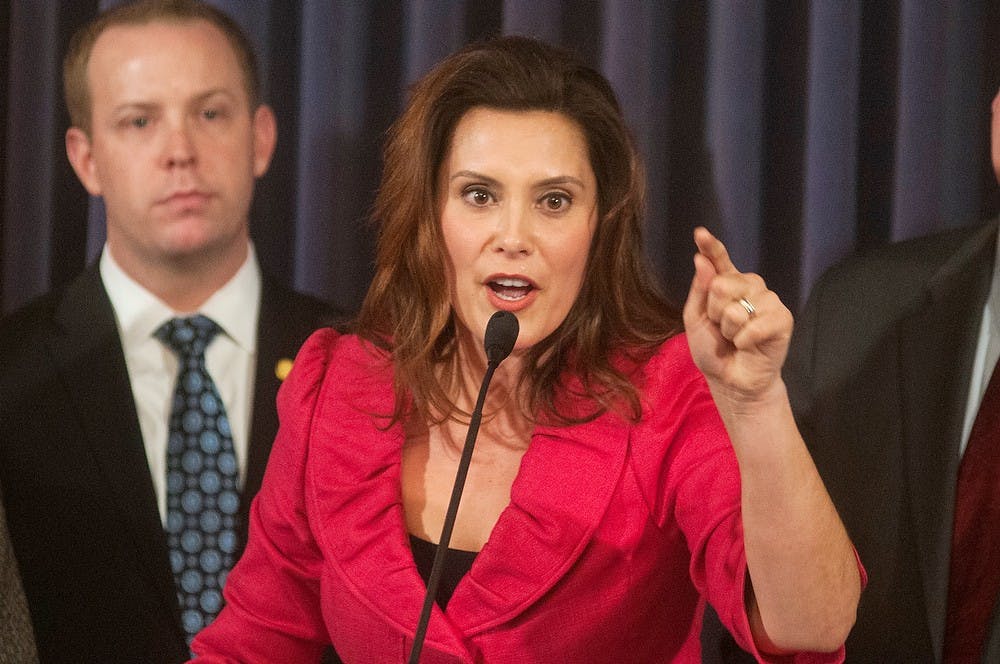Lansing – In his fourth State of the State address, Gov. Rick Snyder delivered a wide-ranging speech brimming with optimism, peppering in a slew of promises that included connecting young people with jobs and retaining an international work force.
The governor emphasized the need to keep talented people from abroad working in Michigan, pledging to create a new office called the Michigan Office for New Americans to encourage legal immigration to the state.
The initiative could impact more than 7,000 international students at MSU who are here on temporary visas.
“If someone has the opportunity to come to our country legally let’s hold our arms open and say ‘Come to Michigan, this is the place to be,’” Snyder said.
House Minority Leader Tim Greimel, D-Auburn Hills, pointed out that immigration is largely out of the hands of state leaders because it is a federal issue.
In a press conference following Snyder’s speech, he said he doubted creating a state immigration office would make a difference, characterizing it as a public relations ploy.
Senate Minority Leader Gretchen Whitmer also said Snyder’s encouragement of immigrating to Michigan was not wholehearted, given what she deemed “intolerant” legislation that recently had been passed in the state.
“If you’re really going to say to the world, ‘Michigan’s the place to come,’ you’ve got to support all people,” Whitmer said.
Sam Singh, D-East Lansing, said he liked the idea of taking steps with immigration, but thought the address missed a lot of details.
“When you look at funding cuts to higher education, reinvestment in communities, (Snyder) didn’t even talk about those areas,” Singh said. “I think that’s what a lot of people in Michigan wanted to hear.”
The governor reinforced his outlook with a plethora of economic statistics that cast Michigan’s future in a positive light, focusing on the state’s business incentives and agricultural and manufacturing industries.
Snyder also announced for the first time his support for a balanced budget amendment to the U.S. Constitution, an unusual move for a governor who usually avoids inserting himself into congressional politics.
The governor’s speech came after a year in which Michigan had seen some of the most contentious policies of the Republican-controlled legislature take effect — from Right to Work legislation to the revised emergency manager law.
But Snyder avoided discussing the more controversial portions of his tenure, and instead focused on the qualities that he said made Michigan “the comeback state.”
Snyder will face re-election this November, although he has not yet announced his candidacy officially.
MSU economics professor Charles Ballard said Snyder might have avoided hot-button issues to pave the way for his re-election.
“He was trying to play it safe,” Ballard said. “There were times when (the speech) could well have been a Democratic speech. He discussed things that are at least as popular among Democrats as Republicans like early childhood education, Medicaid expansion, adoption, homeless veterans, Meals on Wheels.
“I think he was trying to set the tone for re-election by steering as much as he could to a middle course and trying to be positive about improvements in economy.”
During Snyder’s first term, a $1.4 billion budget deficit has been turned into $971 million in extra revenue.
MSU felt the pain as potential funds for higher education replenished state coffers.
Support student media!
Please consider donating to The State News and help fund the future of journalism.
Snyder’s first year in office brought a 15 percent cut to higher education funding that has not returned.
Snyder saved his thoughts on the leftover cash until nearly the end of his speech.
“It’s not about a government that simply says, ‘Let’s spend everything,’” Snyder said. “It’s not about a government that simply says ‘do a tax cut for everything.’ It’s about being a family and being smart.”
But, he added, “there’s an opportunity for some tax relief.”
Snyder avoided any specific recommendations on how he thought the funds should be spent.
Snyder also suggested some of the money be added to the state’s rainy day fund, or to address the state’s long-term bills.
Economics professor Ken Boyer reiterated the difficulty of pushing funding for transportation, saying that Snyder did not address the issue enough to give a clear picture of what he planned to do.
“Of course he has the problem that the Republican majorities that he is working within the legislature (have) opposed him in both of these issues,” Boyer said. “Since this was a partisan speech, it is perhaps no surprise that he made no proposals on transportation issues, knowing that he can not get them through the legislature, and not wanting to upset the Republicans in the legislature.”
During his speech, Snyder avoided some of the controversial political issues currently impacting Michigan — including LGBT rights, the newly-passed voter initiative that requires women to purchase a special rider for abortion and the Right to Work law.
MSU College Democrats President Rawley Van Fossen was disappointed in Snyder’s speech, believing he swept college education and LGBT issues under the rug.
“Where was the shoutout to college students?” Van Fossen said. “He made great remarks on pre-school and K-12 but stopped there and ended it at twelfth grade.”
Van Fossen also felt that Snyder avoided LGBT issues by failing to mention gay marriage in Michigan at all.
“He addressed the inclusion of all citizens,” Van Fossen said. “And said we are a family of 10 million. But how can we be a family and tell gay citizens to be quiet?”
Discussion
Share and discuss “'We've become the comeback state'” on social media.



